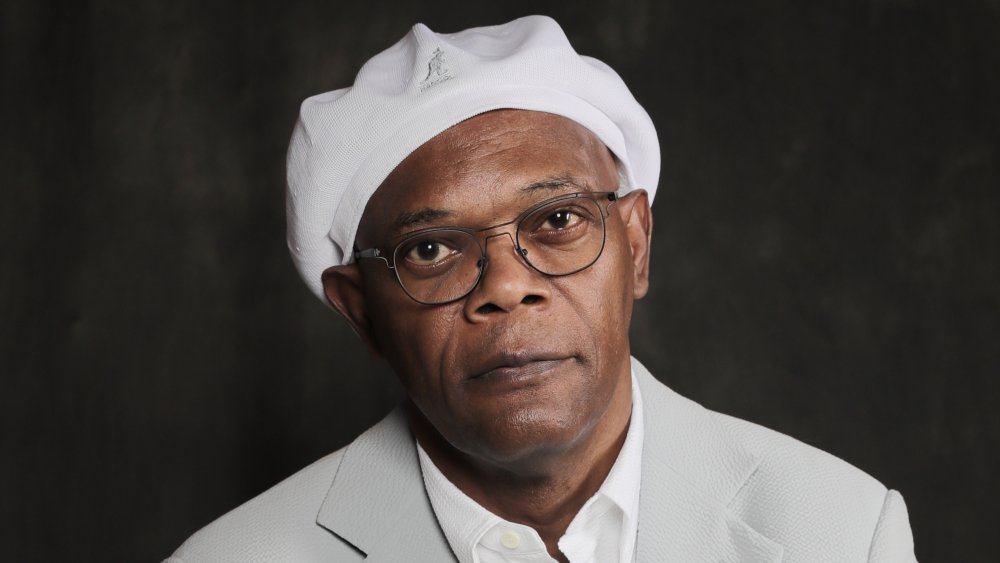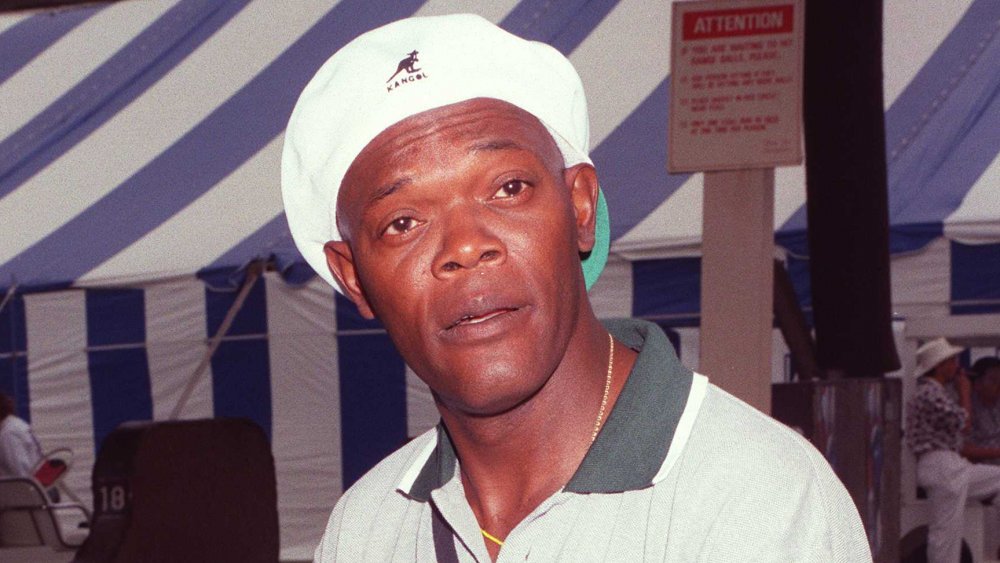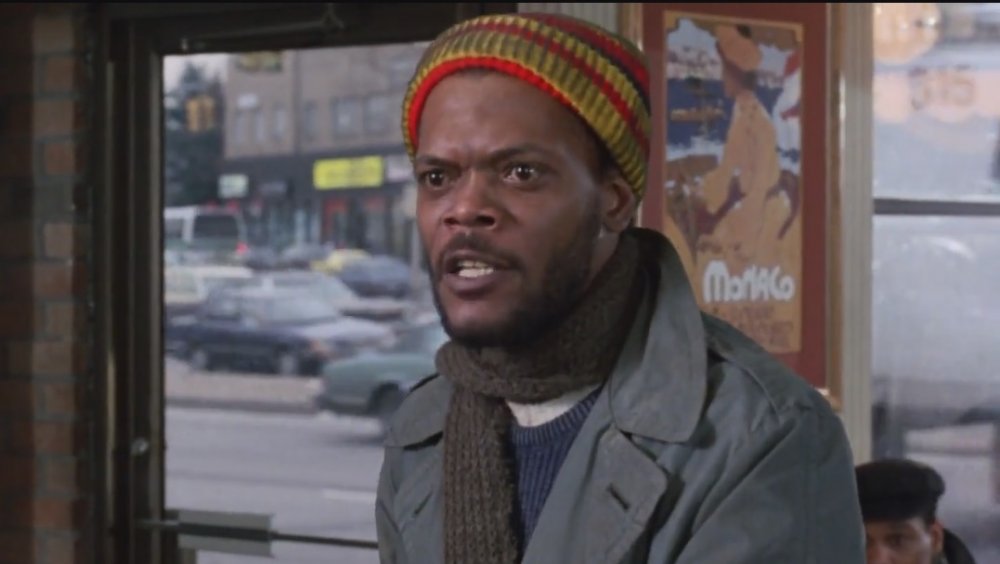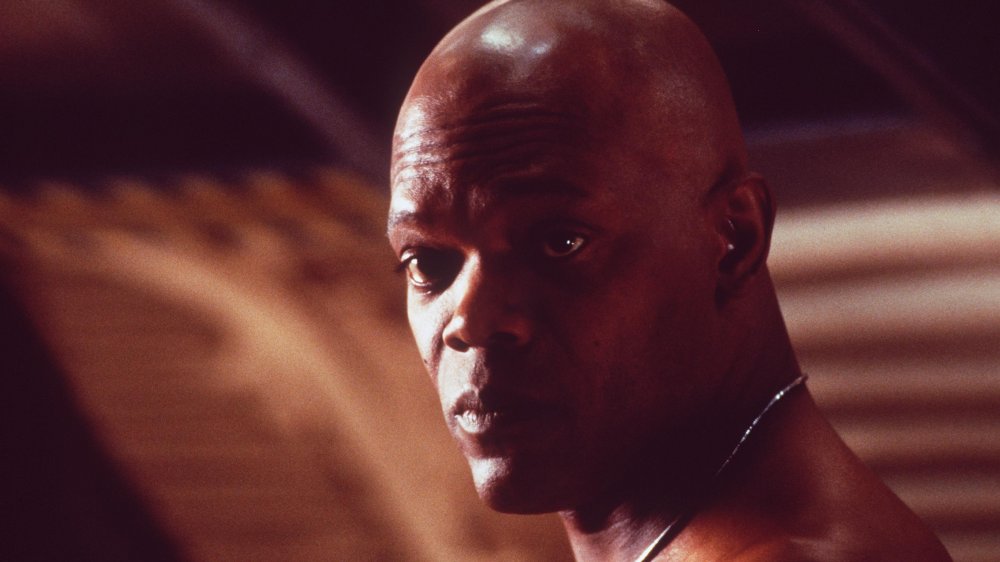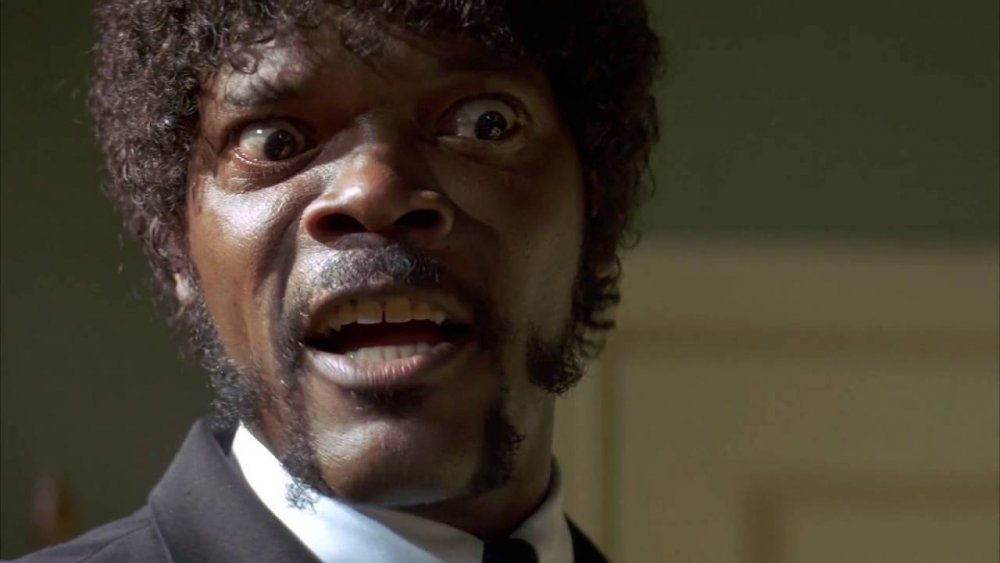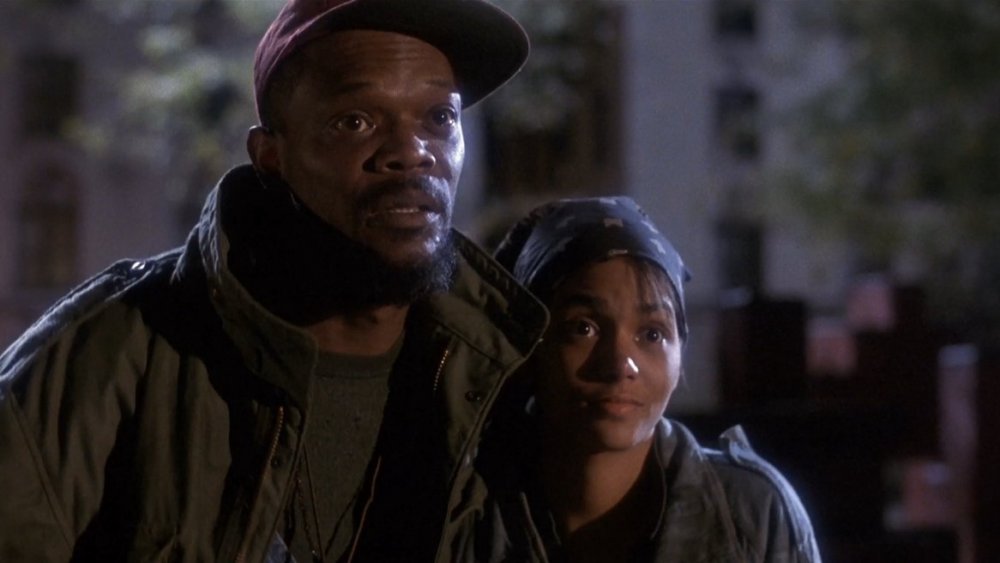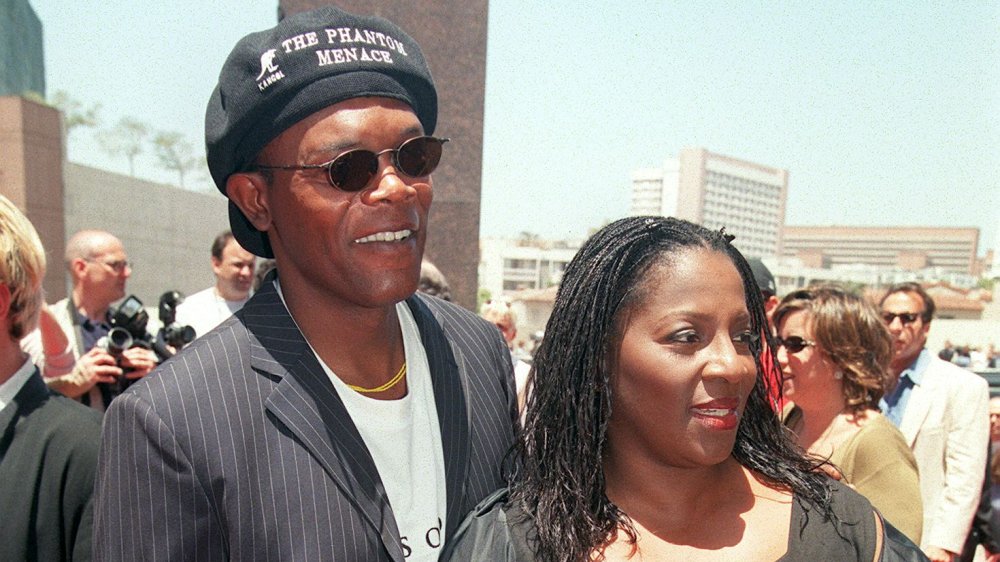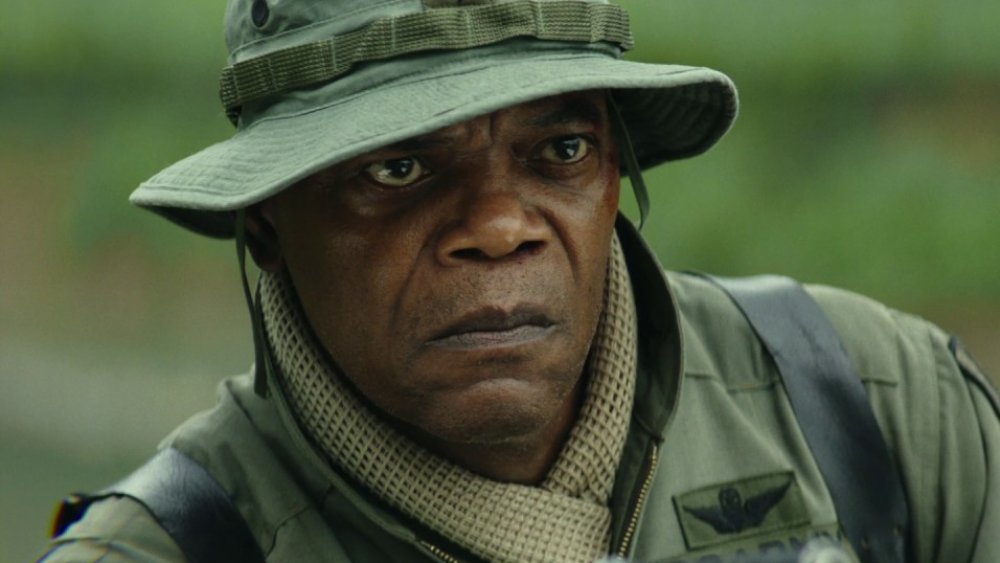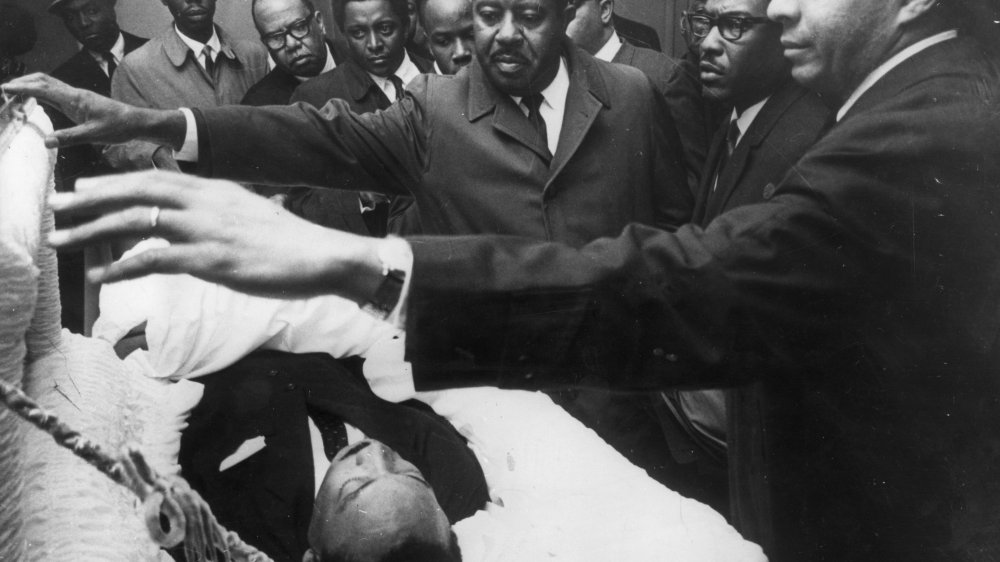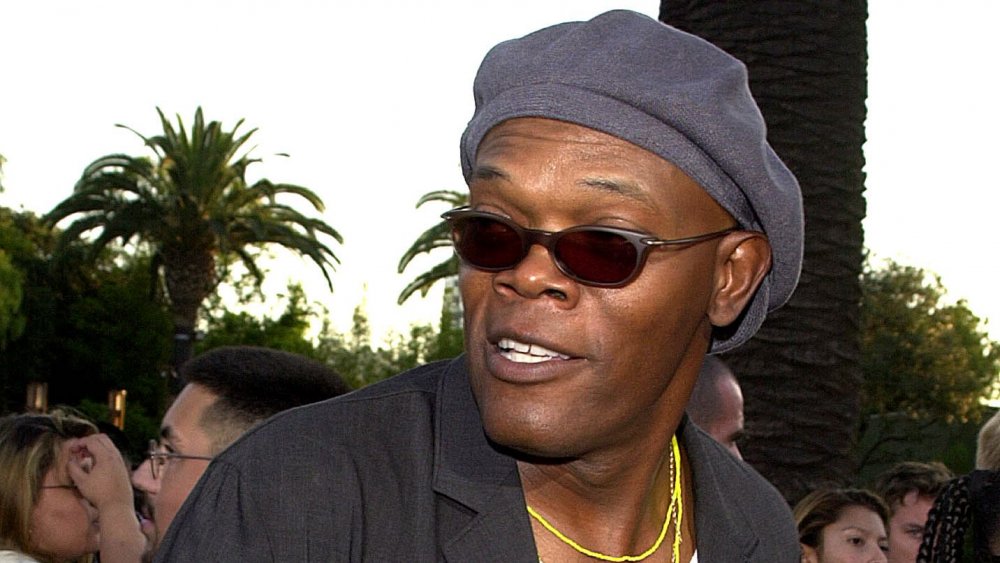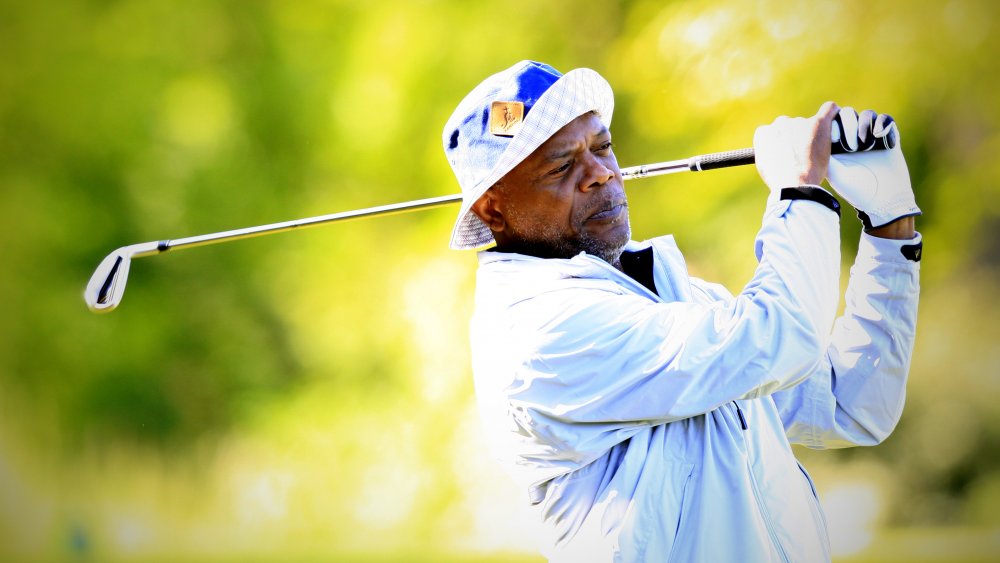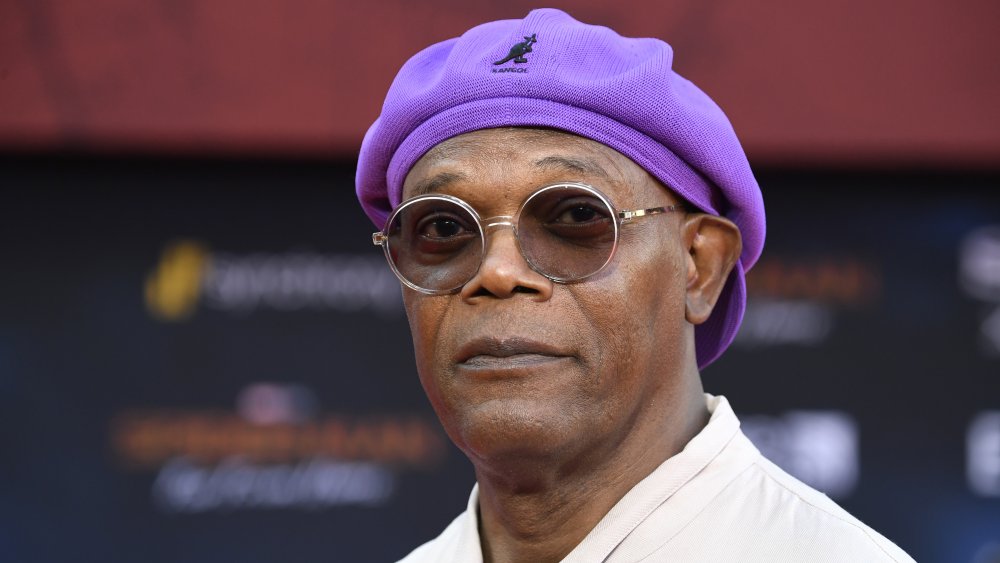The Tragic Real-Life Story Of Samuel L. Jackson
To call Samuel L. Jackson a successful actor would be the understatement of the century as the Oscar-nominated, age-defying celeb is officially the most bankable star working in Hollywood. Jackson, who turned 71 in December 2019, has appeared in more than 120 feature films over the course of his remarkable career. Combined, they've generated over $13 billion at the worldwide box office, more than any other actor in history, according to a Box Office Mojo study (via The Hollywood Reporter).
In late 2018, Applied Network Science determined that Jackson was the most influential actor of all time after it developed an algorithm that measures a person's impact on pop culture — and he only strengthened his claim on the crown the following year when he featured in superhero juggernauts Captain Marvel, Avengers: Endgame, and Spider-Man: Far From Home. Jackson has become the undisputed king of the box office and a true living legend in Tinseltown, which is quite incredible when you consider everything that he's had to endure in his personal life.
From his complicated childhood in segregated Tennessee and his early struggles with drug addiction to the unforgiving disease that's been plaguing his family for years, this is the tragic, real-life story of Samuel L. Jackson.
Samuel L. Jackson only saw his father a couple times
Samuel L. Jackson was raised by his maternal aunt and grandparents in Chattanooga, Tennessee. His mother relocated to Washington DC for work, though she made regular trips home to see her son. Jackson's father, however, was not in the picture. His dad left when he was still in diapers, though he's never been one to complain about it. "It was fine," he said when The Telegraph broached the subject during a 2012 interview. "One of the things that disturbs people about me is that I don't have separation anxiety." Speaking to The Guardian three years earlier, Jackson revealed that he only saw his father (who would go on to die of alcoholism) on two occasions.
He remembers seeing his dad only once as a child and the second time they came face to face was when Jackson's daughter, Zoe, was six months old. The actor happened to be in a show that was playing at a theater near his paternal grandmother's home and decided he wanted to meet her. When Jackson arrived at her house, his estranged father was also there. "There was no way I thought of him as my father," he said. "We had a conversation and he said something like, 'You can't talk to me that way, I'm your father,' and I said, 'No, you're not, we're just two people talking.'" According to Jackson, his maternal grandfather was the real father figure in his life.
Samuel L. Jackson learned how to fight at a young age
Samuel L. Jackson's grandparents both worked when he was growing up so he often went to work with his Aunt Edna, an elementary school teacher who had a huge impact on the future Hollywood star. "She forced me to do a lot of things that I didn't want to do when I was a kid," the actor said during an appearance on Live with Kelly and Michael. "I was reading by the time I was, like, two." Edna's influence helped Jackson stand apart from his peers at a young age, but being the clever one didn't exactly make him popular with the other kids. He was so advanced for his age that he often got himself into trouble by outsmarting the older students from the back of his aunt's classroom.
"When a kid couldn't answer a question in her class she would go, 'Sam' and I would answer the question, and then I would have to fight all lunch time, because all the fourth graders would go, 'Oh, you think you're smart,'" he recalled. "So I was a good fighter and a smart kid."
Jackson also revealed that it was his aunt who sparked his interest in acting. In fact, Edna could claim to have cast Samuel L. Jackson in his very first role. "She was a performing arts teacher and never had enough boys for the parts so she would get me to perform," he told The Guardian.
The truth about growing up during segregation, according to Samuel L. Jackson
During an interview with The Mercury News in 2017, Samuel L. Jackson opened up about what life was really like growing up in segregated Tennessee during the 1950s. "For me, everything was very separate," he recalled. "Even the movie theaters I was going to were all-black theaters ... My whole existence was black." Still, the vast majority of faces up on the big screen were white. There were only a few actors of color for Jackson to look up to at the time, and they never seemed to make it to the end of a picture. "When I did see Sidney Poitier or Harry Belafonte [onscreen], I often questioned my mama about why he died all the time. Then when I started getting cast in something, I'd flip through the script and see what page I died on. I got it, at that point."
According to Jackson, he only crossed paths with white people in person when he went to downtown Chattanooga. During his appearance on Live with Kelly and Michael, he revealed that black people were expected to act a certain way when visiting this part of town. "You don't look people in the eye," Jackson said, though he regularly flouted this rule "because [he] didn't know any better." The future Marvel actor revealed he was taught "lessons that most people don't have to learn today, or shouldn't have to learn."
The reason Samuel L. Jackson always says this word
Anyone who's even vaguely aware of Samuel L. Jackson work knows he's fond of one particular epithet. The actor has become synonymous with the word "motherf*****," a word that he'd used a total of 171 times on the big screen by 2014, according to HuffPost. He's added dozens more since then (Jackson used his favorite curse word a whopping 40 times in 2019's Shaft alone), but he isn't just doing it because he can pull it off like nobody else.
The reason Jackson uses the word so much is because it keeps the stutter he's suffered with since childhood at bay. "I stuttered for a long time, and it actually did help me stop," he told Vanity Fair. "It was spontaneous on how I discovered it — it was the word that hit me, and the word that kind of helped me stop stuttering with the d-d-d's and b-b-b's."
Jackson's stutter never went away, but he's learned to keep it under control with his go-to word. Speaking at the Shaft premiere (via Vanity Fair), the A-lister revealed that he's come to "embrace" the idea of "motherf*****" being his word, but he doesn't see what all the fuss is about. "For me, it's really just another word," he said. "Sometimes there's no better word than 'motherf*****' to describe someone or a situation. It's an all-encompassing word, so yelling it out is the way you say it, and it feels good."
This is why Samuel L. Jackson finally went to rehab
Samuel L. Jackson has openly admitted that he dabbled with hallucinogenics during his college years. "I was a hippie, you know?" he wrote in a guest column for The Hollywood Reporter. "I was taking acid and listening to Jimi Hendrix." Jackson's drug use reportedly escalated in the late '70s when he joined New York's Negro Ensemble Company, the groundbreaking theater group that helped launch the careers of Laurence Fishburne and Denzel Washington. Jackson developed a cocaine habit — one that quickly spiraled out of control. "I was a f***ing drug addict and I was out of my mind a lot of the time, but I had a good reputation," he told The Guardian. "Showed up on time, knew my lines, hit my marks."
According to Jackson, he would routinely rehearse and perform while on drugs. "It was the life," he told The Telegraph. "I was in the theater, the revolution. I fancied myself as Oliver Reed. Part of it is hereditary: my father died of alcoholism. I took it a step further — I drank and I used drugs.
The hard-partying actor realized he had to change his ways when his wife and daughter found him lying on the kitchen floor, completely passed out. "The cocaine was cooked but I'd never smoked it," Jackson said. "That was the first time [my wife] LaTanya realized I was doing something that was greater than just smoking weed and drinking." Jackson then checked into rehab.
Samuel L. Jackson's drug abuse almost cost him his family
Samuel L. Jackson met his future wife, actress LaTanya Richardson Jackson, when he was a student at Morehouse, a historically black men's college in Atlanta, Georgia. Richardson studied at Spelman, the women-only college affiliated with Morehouse. The couple has been married for over 40 years, but not all of those years have been happy ones. Jackson admitted to The Telegraph that his drug-fueled New York theater days were a real low point in their marriage. "I was not affectionate, I was not associative, and I was kind of crazy in a way that I regret," he said of his relationship with LaTanya and their daughter, Zoe. "I've apologized to both."
The long-since sober actor went on to reveal that he and his wife were determined to make things work for the sake of their child. "One of the reasons LaTanya and I stayed together was that we felt that Zoe deserved two parents in the same place, because my wife was also the product of a broken home," Jackson said. LaTanya backed up her husband's version of events when she spoke to Essence in 2018, revealing that keeping their family together was a priority. The Atlanta native also shared her secrets for a long-lasting marriage with the publication. "You have to have a big heart and the Lord," she said. "You're going to have to turn to somebody, something — because men, they are different. They're cut from a different cloth."
The death of Samuel L. Jackson's cousin "radicalized" him
Samuel L. Jackson penned a candid guest column for The Hollywood Reporter in 2018, giving readers an insight into his eventful college years. He wasn't really clued up on politics when he was growing up, but that all changed when he got to Morehouse. When Jackson enrolled in the school in 1966, the number of U.S. troops in Vietnam had reached 400,000. In July of that year, American bombers began air raids on cities in the north of the country for the first time. The war in Vietnam was raging, but Jackson and his friends only started to pay attention to what was happening in Asia after a family tragedy.
"We were like, 'What war?' And then my cousin, who was my age, got killed in 1967," Jackson wrote in his column. "I came to a realization that we were being groomed to be something that I didn't necessarily want to be." The actor became staunchly "anti-war" after his cousin's death, which "radicalized" him against the establishment.
Although Jackson never went to Vietnam as a soldier (college students were safe from the draft at this stage), he would later visit as an actor. The 2017 movie Kong: Skull Island was filmed in a number of different locations along the country's rugged northern coastline. "It's a very interesting place, a very cool place, a very mysterious place," Jackson told the Southeast Asia Globe (via Saigoneer).
Samuel L. Jackson was an usher at Martin Luther King Jr.'s funeral
The year after Samuel L. Jackson's cousin was killed in Vietnam, another sudden death rocked his world. He was a sophomore at Morehouse College when former student Martin Luther King Jr. was assassinated on a Memphis balcony in 1968. "When I first heard, I was actually in the liquor store buying a quart of beer, because it was campus movie night," Jackson revealed in The Hollywood Reporter. "The cashier said, 'Dr. King got shot.' I said, 'Is he dead?' And he said, 'No, not yet.'" Jackson went to his movie night, but the film was cut short when King's death was confirmed. A few days later Jackson was on a plane headed for Memphis to march with the striking sanitation workers that King had been in town to support.
"There was a lot of anger on the plane," Jackson recalled in his THR column. "We didn't know what to expect when we got to Memphis. We all thought it was probably going to be something physical, even though the National Guard was there." When Jackson returned to Atlanta, he was asked to serve as an usher at King's funeral, which began at the Ebenezer Baptist Church and ended on the Morehouse campus. He later joined a college protest — which involved locking Morehouse board members inside the school — that got him expelled for two years. "We were in violation of a whole bunch of laws," Jackson explained.
Samuel L. Jackson fled Atlanta after an FBI tip-off
Samuel L. Jackson was charged with a second-degree felony for his part in the Morehouse hostage situation, but he was apparently already known to the authorities at this stage. It's been reported that Jackson was a member of the Black Panthers, the radical group that sought to arm and educate African Americans in the late '60s. The actor denied this was true during a 2018 interview with Vogue, but he did admit that he and his peers were stockpiling weapons in anticipation of an "armed rebellion" in the United States. In a guest column for The Hollywood Reporter, Jackson wrote, "We were buying guns, which kind of put me on the radar of the powers that be. We were fully expecting a revolution to happen."
He had already proven that he wasn't afraid to go up against the authorities, but Jackson just couldn't say no to his mother. "That summer of '69, somebody from the FBI came to my mom's house in Tennessee and told her she needed to get me out of Atlanta before I got killed," Jackson revealed. "She showed up and said she was going to take me to lunch. I got in the car and she drove me to the airport and said, 'Get on this plane, do not get off. I'll talk to you when you get to your aunt's in L.A.'" Jackson still lives in California; he and his wife reside in Beverly Hills.
Golf saved Samuel L. Jackson's life
Samuel L. Jackson's life improved drastically when he gave up drugs. He shot Spike Lee's Jungle Fever just weeks after finishing rehab (ironically playing a crack addict), a breakout film for the freshly sober actor. "It was the first thing I did without a substance in my body," he told The Telegraph. He's managed to stay on the straight and narrow ever since — and he thanks golf for that. The tough guy actor got hooked on the game when he got clean, and playing regularly has helped him stay that way.
"It is something I can do that occupies time I would otherwise have spent doing very destructive things," he told The Independent. "It's definitely filled a space in my life. When I had to start dealing with my problems, I was worried I wouldn't find something satisfying, beyond work and family, to keep me going."
Golf quickly became part of Jackson's routine. And, according to Jackson, he has a clause written into his movie contracts that allows him time off to play twice a week, and he's been known to combine a round with his rehearsals, too. Speaking to Golf Digest, the actor revealed that used to take his lightsaber onto the green while filming Star Wars: Episode II. "I had to practice whenever I could because there were 109 movements to learn," he said. "One of those moves is similar to a golf swing, used to block an overhand blow."
Samuel L. Jackson's family has been ravaged by Alzheimer's disease
Being the most bankable star in Hollywood doesn't make you or your loved ones immune to illness, as Jackson knows all too well. The actor's family has been decimated by Alzheimer's disease over the years, something he discussed during a 2019 interview with Evening Standard. "I've been surrounded by Alzheimer's most of my life," Jackson said. "My grandfather was my best friend growing up, so it was heart-breaking for me to see him not know who I was." The same happened with Jackson's mother soon after she was diagnosed. "Her mother had it, her brother had it, her sister had it, and so did my aunt on my father's side. It is so cruel having someone who has nurtured you and taken care of you reach a point where they can't even recall your name," he said.
In 2019, Jackson became the new face of Alzheimer's Research UK's #ShareTheOrange campaign, which aims to debunk the idea that dementia is simply a normal part of growing old. This isn't the only health-based charity he's involved with, either. A few years earlier, the Hollywood A-lister appeared on The Graham Norton Show to spread the word about his male cancer charity, One for the Boys. The actor, who is chairman of the charity, told Norton and his audience that he wants to encourage men to open up about health issues. Jackson has supported more than two dozen charities and foundations in his time.

